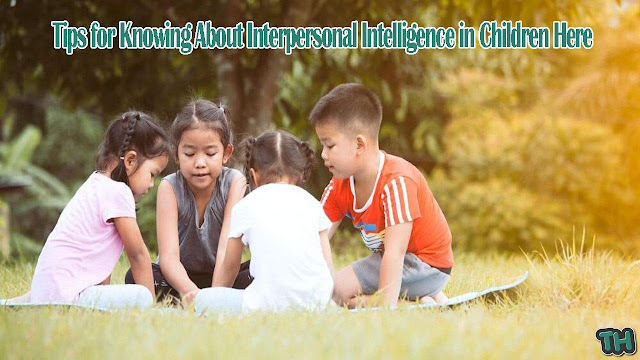Interpersonal intelligence is the ability to assess and understand the needs of others and act according to the way they regulate the interaction with someone. Some of the things that include interpersonal intelligence, include establishing new relationships with other people, cooperating with other people, the ability to interpret others through their body language, communication skills, and empathy.
Indeed, not all children need your help in increasing interpersonal intelligence and social skills to socialize with others. However, this is very important to make it able to interact and socialize with the environment.
Intelligence Can be Influenced Parent Child
Intelligence, sometimes referred IQ (Intelligence Quotient) refers to a person's intellectual function. Genetics plays a big role to influence a person's level of intelligence. In addition to genetics, nutrition, protection from toxins, and the amount of time to play and exercise it can maintain the intelligence of children.
The child's intelligence level can be influenced by the habit of the mother during her pregnancy. A study showed that children born of a mother who often exercised during pregnancy turned out to have a level of intelligence and language skills higher at the age of 5 compared to children born to mothers who did not often sport during her pregnancy.
This turned out to be influenced by sufficient cortisol hormone levels. Cortisol is a stress hormone released when you exercise. This hormone apparently can increase the growth and development of your baby's brain, and other organs.
Before being born to 4 years old, the brain of the child grew rapidly. The brain continues to regulate and develop throughout time. The beginning of the children's can establish social relations is to feel close to parents and/or his caregivers. Children who are close to their parents, for example, can make their brains develop. That is due to nerve cells connected through social and language connections.
The brain is designed to find security, and if the brain does not feel safe, then the brain cannot learn. Parents must ensure that the situation of the child is safe, because if the child does not feel safe, then it can have an impact on their ability to learn.
Interpersonal intelligence or social intelligence involves understanding social situations, relations between humans, and knowing what children have to do in certain situations. Interpersonal intelligence tends to be less attention, but this intelligence is often a determining factor in the success of the future. With interpersonal intelligence, your child can lead a small group or also make it able to socialize well in his environment.
Like this how to teach children to socialize
In general, children will develop certain social skills or skills at the age as below:
- Children aged 2 to 3 years can request attention from others, and make social contact with other people verbally, such as saying 'hi' or 'see you.
- Children aged 3 to 4 years, can take turns while playing games, imagining with dolls, and start verbal communication with actual words.
- Children aged 4 to 5 years can empathize with their friends, like saying 'I'm sorry, 'please', or 'thank you.
- Children aged 6 to 7 years can empathize with others, such as crying because of sad things. At this age, children tend to be able to share and use body posture and signals. But he has not been able to understand the clear difference between true and wrong.
As a parent, you need to teach your children to be able to socialize with other people. Some of these things can teach your baby, including:
Get used to eating together
When eating together, you can interact with him. It can teach it how to communicate with others, how to listen to what other people say, and how to respond to other people's conversations.
Teach and introduce body language
For example, when the child is watching TV, you can reduce the volume a little and ask for a moment what a cartoon character is feeling on the TV he watched. You can also ask him about the character of the animated character he likes. This can train the ability of children to capture other people's feelings through body movements.
Teach that the child becomes more vocal (brave voice)
Let the child speak for himself. Your child needs an opportunity to show his social skills, so don't always try to be a spokesperson. If the child feels nervous when talking to other people, then prepare small steps to build his belief. For example by asking him to say 'excuse me' to the toy shop officer, and let him ask directly to the officer about the toy he wants.
Interpersonal intelligence has several important elements, including verbal language fluency and skills in conversation, knowledge of social roles and rules, Listening skills effectively, Understanding what others are interested in Social effectiveness or how to be socially, effectively confident in the environment and self-minded.
Teach the child to be confident and not afraid of his environment. That can increase the intelligence of interpersonal. Let him solve the problem himself, don't help him too often. However, always point and observe the child when socializing with friends and the environment.


Post a Comment for "Tips for Knowing About Interpersonal Intelligence in Children Here"